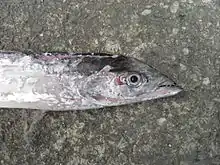Tentoriceps
Tentoriceps is a monotypic genus of cutlassfish, family Trichiuridae, from the Indian and Pacific Oceans. The sole species is Tentoriceps cristatus.[1][2][3] Its common name is crested hairtail.[2]
| Tentoriceps | |
|---|---|
 | |
| Head with the "crest" | |
| Scientific classification | |
| Domain: | Eukaryota |
| Kingdom: | Animalia |
| Phylum: | Chordata |
| Class: | Actinopterygii |
| Order: | Scombriformes |
| Family: | Trichiuridae |
| Subfamily: | Trichiurinae |
| Genus: | Tentoriceps Whitley, 1948[1] |
| Species: | T. cristatus |
| Binomial name | |
| Tentoriceps cristatus (Klunzinger, 1884) | |
| Synonyms | |
|
Trichiurus cristatus Klunzinger, 1884 | |
Distribution
Tentoriceps cristatus has Indo-West Pacific distribution: it is found in the Indian Ocean (including the Red Sea) and in the Western Pacific Ocean, between the Tasman Sea and southern Japan. It is a benthopelagic to pelagic species that occurs in coastal waters 30–110 m (98–361 ft) deep, but avoids areas of low salinity.[2][4]
Description
Typical for cutlassfishes, Tentoriceps cristatus has extremely elongate and strongly compressed, ribbon-like body, tapering to a point. The dorsal profile of head is evenly convex. It grows to a maximum length of about 90 cm (35 in) TL, but common length is 30–70 cm (12–28 in) TL.[4]
Fisheries
Tentoriceps cristatus is a minor commercial species caught mainly mixed with other cutlassfish in southeast Asian countries.[2][4]
References
- Eschmeyer, W. N. (7 January 2015). "Catalog of Fishes". California Academy of Sciences. Retrieved 12 February 2015.
- Froese, Rainer; Pauly, Daniel (eds.) (2014). "Tentoriceps cristatus" in FishBase. November 2014 version.
- "Tentoriceps Whitley, 1948". Integrated Taxonomic Information System.
- Nakamura, I.; N.V. Parin (1993). FAO species catalogue. Vol. 15. Snake mackerels and cutlassfishes of the world (Families Gempylidae and Trichiuridae). An annotated and illustrated catalogue of the snake mackerels, snoeks, escolars, gemfishes, sackfishes, domine, oilfish,cutlassfishes, scabbardfishes, hairtails, and frostfishes known to date (PDF). Rome: FAO. p. 102.
